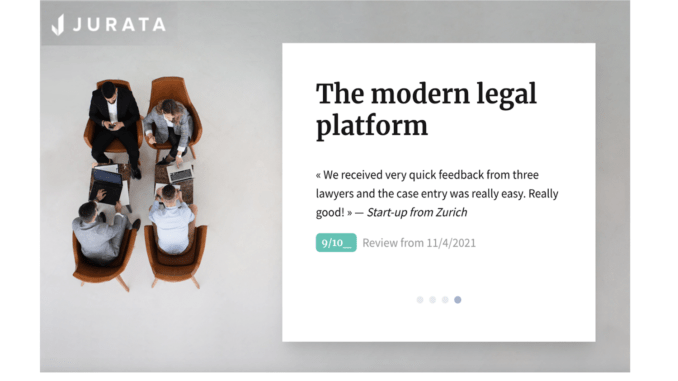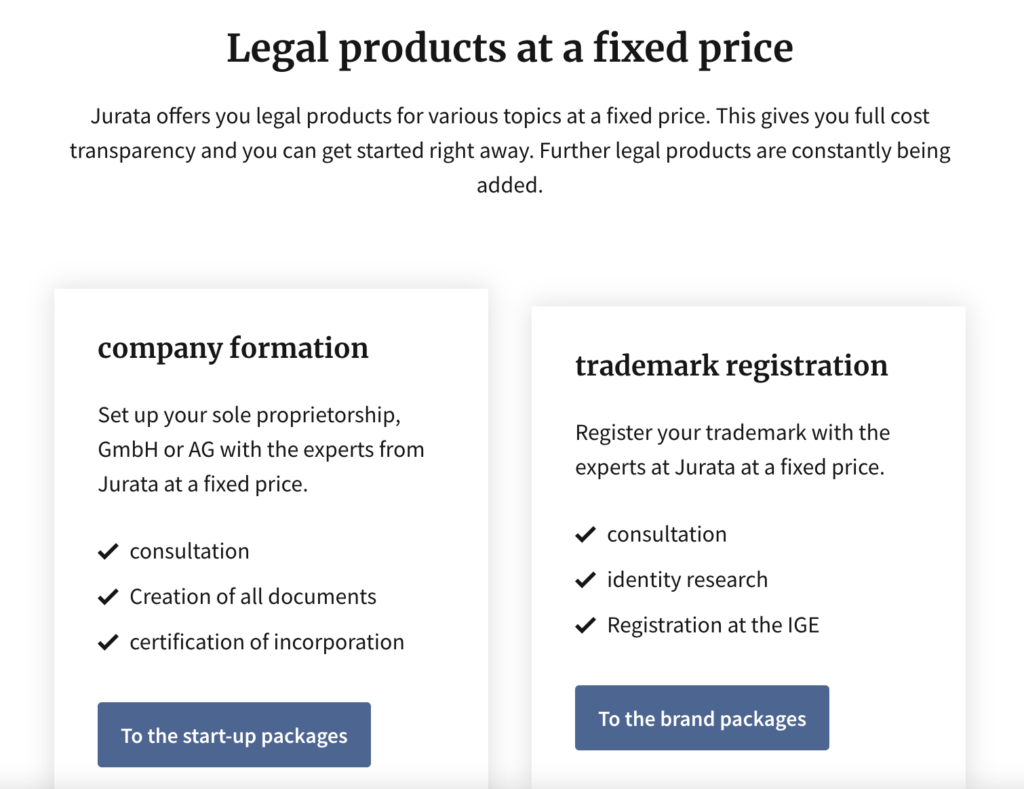
Legal marketplace startup, Jurata, has closed an oversubscribed pre-seed funding round of $0.54m that will ‘pave the way for international expansion’. It’s another sign of how legal services for the SME sector are rapidly changing.
Just this month Sweden’s Lexly bought Denmark’s LegalHero to provide productised legal services to SMEs and consumers. Meanwhile Australia’s Sprintlaw and Sweden’s PocketLaw have both launched in London – also with a non-traditional approach to legal services.
Switzerland-based Jurata said that its mission ‘is to provide individuals and SMEs with access to legal services in a transparent, digital and intuitive way’.
‘Legal customers, be they companies or private individuals, are confronted with a market that is confusing, not very accessible and, in particular, not transparent in terms of pricing.’
So, how does it work? Well, it’s a bit of a hybrid approach, although not that different from Rocket Lawyer and LegalZoom.
There are some fixed fee legal products (see below). But there is also a marketplace where you can be connected to lawyers who have listed themselves on the site. Incredibly, around 1,200 lawyers, or roughly 10% of the Swiss lawyer population, are already present on Jurata.

A client states their legal need and can get offers from the lawyers who are listed. However, the lawyers who provide the work in this way don’t have to give you a fixed fee, but that is still an option. And one would guess that lawyers who offer some price certainty are more likely to get picked – at least one would presume so…?
At present the Jurata platform, ‘matches several hundred mandate requests per month with suitable lawyers’.
Co-founder David Roegiers, said: ‘In the past, I was always overwhelmed when I had to take care of legal matters in my private or business life. Many people know this feeling, as we have learned from numerous conversations. With Jurata, we want to change this.
‘Technology is the key to making basic legal services more accessible and affordable for a broad spectrum of individuals and SMEs. Lawyers, on the other hand, should be able to focus on providing tailor-made advice in complex legal cases.’
Also, Roegiers told Artificial Lawyer, that in relation to fixed fees: ‘We notice an untapped potential of private and SME clients, that are willing to pay only for fixed price legal packages. A significant part of the lawyer’s activity can be automated (such as standard document generation, incorporations, trademark submissions, …), in order to serve the aforementioned need.
‘Certainly, the lawyers’ profession will always maintain a bespoke aspect, which is a service to be billed based on time. However, we see a European climate in terms of technology, mindset, and regulation, that allows for legal productisation to enter the law firm’s revenue stream.’
Co-founder Luca Fábián, added: ‘The high acceptance of our platform among the legal community is very encouraging. We are convinced that all parties benefit when new, innovative business models are established in the legal market. Accordingly, we work closely with lawyers in the further development of the platform.’

Going back to the product side of things, the company stated that they are investing heavily in creating more legal products and also trying to find ways to automate ‘basic legal services’.
All in all, this is great to see, and this development along with the others noted above, suggests that the status quo is changing in the SME legal sector – in large part because too many ‘traditional’ law firms have milked the old model to the point that people are looking for a better solution.
It would seem that Jurata and the others are pushing on an open door in terms of growth in Europe, as well as having plenty of opportunities for growth in other key markets, such as the UK. The US may be a bit trickier because of the well-developed presence of LegalZoom and Rocket Lawyer, but then, the legal world is a big place. There is still a huge amount of growth potential for this market segment.
One last point is this: will what is happening here rise upwards and disrupt Big Law?
Some major firms have already adapted, having created their own suites of legal products aimed at banks and corporates, as well as developing process groups and flexible resourcing teams. So, possibly it will be much harder there.
But, the area where they could make real inroads is in the UK 70 to 200 ranked group, i.e. those firms that serve individuals and SMEs and are generating revenues in the tens of millions to single millions. Here, the likes of Sprintlaw, PocketLaw, Jurata, and others, could make a significant impact.